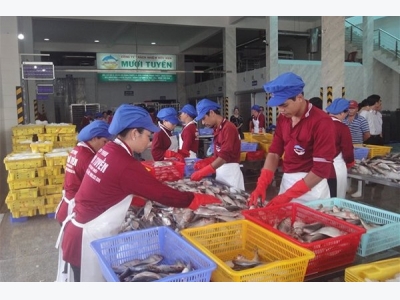Ho Chi Minh City helps Binh Thuan consume safe agricultural products

Seafood processed at Muoi Tuyen Co Ltd - PHOTO: TT
The Ho Chi Minh City Food Safety Board and the Department of Agriculture and Rural Development of Binh Thuan Province on November 13 inked a cooperation agreement on producing, trading and consuming safe agricultural and aquatic products of Binh Thuan.
Products will be closely controlled from production to processing and trading stages, according to the agreement.
Pham Khanh Phong Lan, director of the HCMC Food Safety Board, said in a press release that safe food chains would help reassure consumers. It is important to cooperate with prestigious and large distributors to maximize the effectiveness of these supply chains.
With a population of around 10 million people, HCMC is a huge market for Binh Thuan’s seafood, dragon fruit and other produce, Lan said.
The two sides agreed to jointly develop safe supply chains of farm produce and seafood, create favorable conditions for Binh Thuan’s enterprises to provide such products to HCMC, and ensure product safety.
Mai Kieu, director of the Department of Agriculture and Rural Development of Binh Thuan Province, said the province has had difficulty developing supply chains. Therefore, the cooperation with HCMC is extremely important.
On the same day, the Saigon Union of Trading Co-operatives (Saigon Co.op) signed a cooperation agreement with Muoi Tuyen Co Ltd in Binh Thuan Province to help consume 100 tons of seafood processed by the company a month.
Saigon Co.op general director Nguyen Thanh Nhan said the store chain operator would raise the volume of the company’s seafood sold at its outlets and offer products of other enterprises in Binh Thuan in the coming time.
Saigon Co.op expects to develop safe food chains for Binh Thuan’s other products, especially dragon fruit.
Có thể bạn quan tâm
 Rice farmers rue missing out on price rise
Rice farmers rue missing out on price rise Many farmers in the Mekong Delta are regretting that they did not stockpile any rice as prices rise continuously and supply remains limited.
 Vietnam paves pathway to Middle East market
Vietnam paves pathway to Middle East market The Middle East is a large market with more than 400 million consumers from 16 countries. Vietnam can export rice, tea, coffee, pepper, natural rubber, cashew
 Vietnam sees opportunity in fruit, vegetable, flower exports
Vietnam sees opportunity in fruit, vegetable, flower exports The country’s export turnover on these farm produce has already exceeded rice and crude oil. Vietnam sees opportunity in fruit, vegetable, flower exports